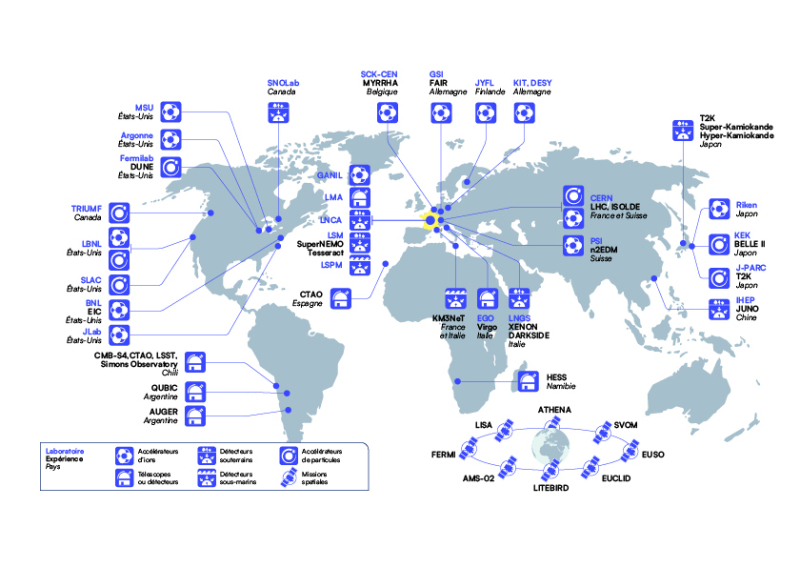An open global strategy
The Institute has many bilateral and multilateral collaborations with its partners in Europe and around the world. With them it is involved in defining common research and funding strategies and initiating programmes that meet its needs and activities. Three objectives are targeted: developing excellence, deploying major infrastructures and encouraging the mobility of researchers.
Members of more than 80 nationalities are present in CNRS Nuclear & Particles laboratories, with around 30% of staff being foreign. This mix reflects the links forged over the years with leading countries in the fields of nuclear physics, particle physics and astroparticle physics, but also a growing presence of these fields of research in emerging countries.
To encourage and support these collaborations, CNRS Nuclear & Particles has a department devoted to setting up and supporting European and international projects (Partnership, Europe and International Cooperation Department). This provides advice, expertise and legal monitoring, as well as links with dedicated CNRS departments (including the European and International Department - DEI - and CNRS representative offices abroad and in Brussels) to support researchers in their international endeavours.
Present on five continents
CNRS Nuclear & Particles international strategy extends to several continents beyond Europe, and in recent years it has been extended to South America and Asia in particular. Collaborations are carried out within the context of framework and specific agreements between CNRS Nuclear & Particles and its international partners. The vast majority of these are based on major research infrastructures around the world:

CNRS international cooperation tools
CNRS Nuclear & Particles research teams also use CNRS international cooperation tools designed to support collaborations and researcher mobility:
- 7 International Research Laboratories (IRL) : USA : CPB (Centre Pierre Binétruy), NPA (Nuclear Physics and Cosmology), PPC (Particle Physics and Cosmology) ; Japon : ILANCE (International Laboratory for Astrophysics, Neutrino and Cosmology Experiments), TYL (Toshiko Yuasa Laboratory) ; Germany : DMLab (Dark Matter Laboratory) ; Canada : NPAT (Nuclear Physics, Nuclear Astrophysics and Accelerator Technologies)
- 9 International Research Networks (IRN) : TERASCALE (International research network on the experimental and theoretical search for new physics at the TeV scale), NEUTRINO, ASTRANUCAP (Astrophysics, STructure, Reactions, and Analysis with NUClear beams and APplications), FCPPN (France-China Particle Physics Network), FJPPN (France-Japan Particle Physics Network), FKPPN (France-Korea Particle Physics Network), FENMTO (Frontiers in Exotic Nuclei, Multidisplinary research and TheOry), PAULINE (Paarl Africa Underground Laboratory International Networking), FANPEN (France-North America Network on the Physics of Exotic Nuclei)
- 5 International Research Programs (IRP) : With Japon (NuPIC), Ukraine (IDEATE), Belgium (ACNu), Australia (XERD-DM-n) and USA (UCMN, in partnership with CNRS Physique)
- 7 International Emerging Actions (IEA) : Selected through an annual call for projects, these joint research programmes are devoted to emerging research topics between two international partners.